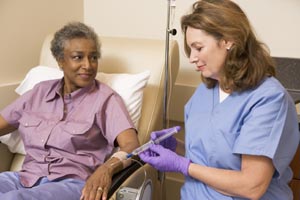The University of Alabama at Birmingham is launching an initiative to expand access to primary care — especially for rural and other under-served populations — in Alabama, a state that ranks 49th nationally for access. The UAB School of Medicine will use a five-year, $5.25-million grant from the federal Health Resources and Services Administration to create an Area Health Education Center program that will work to recruit, support and retain health-care professionals in all 67 Alabama counties.
 The AHEC will help reduce health disparities by improving the quantity, diversity, distribution and quality of Alabama’s health-care workforce, says Cynthia Selleck, DSN, associate dean in the UAB School of Nursing. “AHECs connect students to careers, professionals to communities and communities to better health. We inspire, train, recruit and retain a diverse and broad range of health professionals to practice in communities in which the need is greatest,” says Selleck, director of the Alabama AHEC and former president of the National AHEC Organization.
The AHEC will help reduce health disparities by improving the quantity, diversity, distribution and quality of Alabama’s health-care workforce, says Cynthia Selleck, DSN, associate dean in the UAB School of Nursing. “AHECs connect students to careers, professionals to communities and communities to better health. We inspire, train, recruit and retain a diverse and broad range of health professionals to practice in communities in which the need is greatest,” says Selleck, director of the Alabama AHEC and former president of the National AHEC Organization.
One analogy for AHEC is the agriculture extension office, with its agents posted throughout the state: They don’t raise crops or till the soil, but they do provide expertise, advice and resources to farmers.
AHECs work in a similar fashion, providing services and programs for physicians and other health-care professionals working with rural or under-served populations. The Alabama AHEC will work with UAB’s health-profession schools and other schools and training programs to encourage graduates to consider careers in primary care in a rural or under-served area.
| "AHECs connect students to careers, professionals to communities and communities to better health." |
“UAB is committed to encouraging resident physicians and nursing, medical and health professions students to consider careers in rural or other under-served areas,” says William Curry, M.D., associate dean for Primary Care and Rural Health. “The AHEC will provide the first statewide comprehensive effort, incorporating students and graduates from educational institutions across Alabama.”
The program also will reach out to young people in those communities who may consider a career in health care beyond their grasp.
“Studies have shown that patients in rural or under-served populations often respond more positively to health-care professionals who are themselves products of those same environments,” Selleck says. “We intend to implement programs to target under-represented minority, rural and other disadvantaged Alabama youth and adults for careers in the health professions.”
The program will create five regional, community-based centers comprising all Alabama counties. Each AHEC will work to boost the numbers of practicing health-care professionals in its area and develop programs to overcome barriers to care in those target populations.
The five regional centers will be located at Alabama A&M University in Huntsville, Quality of Life Health Center in Gadsden, Maude Whately Health Center in Greensboro, Central Alabama Veteran’s Health Care System in Tuskegee and Jefferson Davis Community College in Brewton. The AHEC program office will be housed in the UAB Department of Family and Community Medicine.
| The AHEC program is a plank in UAB’s overall Academic Primary Care Plan, an initiative developed under the direction of Ray Watts, M.D., dean of the UAB School of Medicine, to improve the health status of the people of Alabama. The plan provides increased scholarships and loan-repayment assistance for medical students pursuing a career in a primary-care field. The plan also enhances the primary-care curriculum and recruitment of students interested in primary care and rural medicine. |
The AHEC program is a plank in UAB’s overall Academic Primary Care Plan, an initiative developed under the direction of Ray Watts, M.D., dean of the UAB School of Medicine, to improve the health status of the people of Alabama. The plan provides increased scholarships and loan-repayment assistance for medical students pursuing a career in a primary-care field. The plan also enhances the primary-care curriculum and recruitment of students interested in primary care and rural medicine.
“In almost every category and for almost every measure, the state’s health statistics paint a bleak picture,” says T. Michael Harrington, M.D., chair of the UAB Department of Family and Community Medicine. “We have the highest rate of diabetes and the second highest rate of obesity nationally. Alabama is one of the few states that did not have a statewide AHEC program, and we are confident this program will help improve the care of the medically under-served in this state.”
Partner organizations involved in the AHEC Advisory Committee are UAB Huntsville Regional Medical Campus, University of Alabama, University of Alabama in Huntsville, University of South Alabama, Samford University, Auburn University, Alabama College of Osteopathic Medicine, Alabama Department of Public Health, Alabama Department of Economic and Community Affairs, Alabama Department of Education, Alabama Hospital Association, Alabama Rural Health Association, Alabama Rural Development Office, Morehouse School of Medicine, Alabama Post-Secondary Education Chancellor’s Office and the Alabama Primary Health Care Organization.
